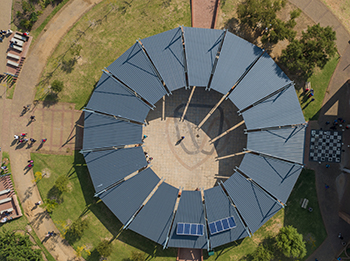Latest News Archive
Please select Category, Year, and then Month to display items
17 May 2024
|
Story Anthony Mthembu
|
Photo Supplied
 Prof Magdalena Sobon from Poland and Michael Jackson Blebo from Ghana shared their expertise with staff and students during their visit to the Department of Fine Arts at the University of the Free State.
Prof Magdalena Sobon from Poland and Michael Jackson Blebo from Ghana shared their expertise with staff and students during their visit to the Department of Fine Arts at the University of the Free State.
In a concerted effort to solidify its identity in South Africa and abroad, the Department of Fine Arts at the University of the Free State (UFS) recently played host to two distinguished artists: Prof Magdalena Sobon from the Wladyslaw Strzeminski Academy of Fine Arts in Lodz, and the Ghanaian multidisciplinary artist, Michael Jackson Blebo.
Dr Adelheid Von Maltitz, Senior Lecturer in the Department of Fine Arts at UFS, lauded the visits, held between 19 and 29 March 2024, as an enriching learning experience for the faculty and students within the department.
The visit highlights
During their visit to UFS, Prof Sobon and Blebo actively engaged with the department’s staff and students. Prof Sobon, an acknowledged paper-making artist, conducted a comprehensive two-day workshop, imparting extensive knowledge in this craft. As a direct outcome of this workshop, the department has procured the requisite equipment and materials, enriching the students’ capabilities in this medium. Blebo on the other hand, conducted a demonstration on clay bust modelling and both artists participated in critique sessions with the fourth-year students. Dr Von Maltitz underlined the significance of Blebo’s African heritage, noting, ‘’For our students to interact with a young, accomplished artist of his calibre is of benefit to them in terms of how they may envision their art careers.’’ Of particular note were Prof Sobon’s interactions with the students, wherein she shared her own artistic practices from her student years during her lectures.
In addition to their engagements with the students, Prof Sobon and Blebo also had the opportunity to present their research to second-year sculpture students at the Richmond Land Art Project, an off-campus initiative fostering art creation centred on socio-economic and other pertinent issues.
Future collaborations
Dr Von Maltitz emphasised the importance of maintaining ties with these eminent artists for the department’s growth and global outreach. Prof Sobon’s visit has paved the way for two department members to visit the Wladyslaw Strzeminski Academy of Fine Arts in Lodz in the near future. ‘’These individuals will get an opportunity to learn about studio setups and network with fellow academics, creative researchers, and artists,’’ stated Dr Von Maltitz. She hailed the visit by the two artists as both stimulating and fruitful, particularly for the students.
Renewable energy systems an economical investment for the UFS
2017-06-14

The Qwaqwa Campus Arena equipped with freestanding
roof solar panels.
Photo: iFlair Photography
Renewable energy systems are said to be very expensive to implement initially, but in the long run they provide high economic returns.
With their decision to install renewable energy, the University of the Free State Department of Facilities Planning has now also adopted this innovative technology. They have chosen less capital-intensive solar power-generating options to generate electricity in various buildings and parking areas on all three UFS campuses.
“As per the UFS Energy Management Policy, all designs incorporate efficient, renewable energy sources varying from LED lights to solar power,” says Anton Calitz, Electrical Engineer in University Estates’ Department of Facilities Management.
South Campus taking the lead in renewable energy usage
In December 2016, a total of 26 solar-driven LED street-light poles were installed at the recently built Legae Residence’s parking area and the perimeter security area on the South Campus. This low-maintenance system improves security after dark and is independent of the national power supply, which is an important advantage during power outages. With no requirements for major earthworks and cable setting, operational costs are reduced.
The recently built infrastructure also takes pride in being the first to have a greywater system installed. This system will also be installed at three other residences on the Bloemfontein Campus in 2017. Greywater is made up of bath, shower, and bathroom sink water. The water is reused for toilet flushing, as well as for irrigation purposes.
Various UFS electrical operations to depend on solar power
On the Bloemfontein and Qwaqwa Campuses, the computer laboratories as well as the Thakaneng Bridge Student Centre and the projected Afromontane Research Centre will be equipped with freestanding roof solar solutions during 2017. These systems are designed to operate independently of the power grid (Eskom).
The systems only operate during sunlight hours when the PV solar panels are heated by the sun, making them suitable for operations such as ventilation fans, water pumps, and small circulation pumps for solar thermal water-heating systems.